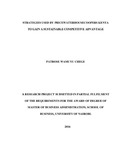| dc.contributor.author | Chege, Patrose W | |
| dc.date.accessioned | 2017-01-04T09:01:26Z | |
| dc.date.available | 2017-01-04T09:01:26Z | |
| dc.date.issued | 2016 | |
| dc.identifier.uri | http://hdl.handle.net/11295/98800 | |
| dc.description.abstract | This research analysed the strategies used by PwC Kenya to obtain a sustainable competitive advantage. PwC Kenya is one of the leading professional services firm in Kenya. The organization however exists in a highly competitive environment together with three other large professional services firms and other small to medium sized players all competing for a similar market.Most of the services offered by the different professional services firms are similar in nature given the regulatory environment in which they operate. Each organisation must thus come up with a robust strategy in order to remain ahead of the pack. The research focused on two broad views that can be employed to obtain a sustainable competitive advantage. The first is the resource based views in which organization leverage on their internal capabilities while the second is industrial organisations views in which organisations leverage on opportunities presented by the external environment in order to be competitive. The literature review looked at scholars who have contributed to these views. It analysed the importance of strategy in organisations and the need for organisations to select a suitable strategy to navigate the turbulent environment and remain relevant and successful. The research then looked at the theories on sustainable competitive advantage as well as the challenges in obtaining it. The research looked at the role that differentiation, resources, innovation and core competencies play in creating value addition and as such sustainablility. The study focused on the role that knowledge management system play as a form of resource based views to obtain a sustainable competitive advantage. The research also looks at the empirical and knowledge gaps especially in the utilization of knowledge management systems for sustainability.The research was conducted via a case study and content analysis was used to compile the report. The research revelead that PwC Kenya is deliberate about strategy formulation and has focused on three strategeies to ensure it is competitive. These are a robust marketing strategy, a service delivery strategy and a focused human resource strategy. The research also revelaed that PwC leverages on its core competencies in order to implement and drive these strategies. The core competencies identified are subject matter experts, knowledge based systems and good information technology systems. The researcher linked the strategies employed in relation to the theories introduced.The researcher revealed that PwC leverages on its internal environment as well as responds to pressures exerted by the external environment. PwC thus employs a hybrid method that borrows both from resource based and industrial organization views. The researcher also compares the study to other global and local research conducted on competitive advantage. The common themes that emerge are innovation, differentiation and information systems as key to driving competitive advantage. The researcher however notes that the differentiator is the focus on knowledge management systems. The limitation is that focus was only placed on one organization in Kenya and thus additional avenues of research into other professional services firms in the region is recommended. | en_US |
| dc.language.iso | en | en_US |
| dc.publisher | University of Nairobi | en_US |
| dc.rights | Attribution-NonCommercial-NoDerivs 3.0 United States | * |
| dc.rights.uri | http://creativecommons.org/licenses/by-nc-nd/3.0/us/ | * |
| dc.title | Strategies Used by Price Water House Coopers Kenya to Gain a Sustainable Competitive Advantage | en_US |
| dc.type | Thesis | en_US |



